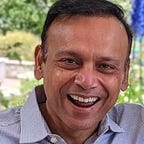Don’t Start a Company — Be Obsessed With Something
It’s easy to start a company. It’s also very exciting, and probably one of the best professional experiences one can have, whether the startup becomes YouTube or doesn’t go too far. I always find it hugely inspiring to meet fellow entrepreneurs relentlessly trying to bring their ideas to life — there is a certain crazy spirit we all share.
But ask any entrepreneur and the reality is that building a business and changing the world is not easy. There’s no known formula to it — it’s a lot about dealing with “known unknowns” and discovering “unknown unknowns” while dealing with the thousand daily tasks of building a product, team and company, while finding market fit and getting the product to market.
So the first question I ask entrepreneurs when they ask for feedback on their idea or the more general question “Should I start a company” is: Why are you doing this? And I get the typical answers — usually around passion, opportunity, unique insight, sometimes a personal situation. My next question almost always creates an awkward silence: Are you obsessed enough by this idea that you would you sell everything you own to make this work?
The thing is words like “passion” are very easy to say, but a lot harder to quantify. It’s easy to be passionate about something. It’s even easier to say “I’m passionate about something”. But “passion” is not good enough. You need to be more than passionate — in fact, the question I would ask myself and anyone else wanting to start something is: Am I obsessed with this? Unless you are, don’t bet your life on it.
Steve Jobs was obsessed with making things simple and beautiful. In his Stanford Commencement Speech, he talks about how his obsession with typography in college led to Apple’s beautiful fonts. In Steve’s memorandum, Jonny Ive talks about how during their travels Steve would rush out of a hotel if it was not good. Steve’s obsession showed in pretty much everything he created, not just Apple or the iPhone. You can see it in NEXT, Pixar, Apple retail stores and more.
Jeff Bezos is obsessed with Customer Service. In this interview, he talks about Amazon’s mission — to be “earth’s most Customer centric company”. He is also famous for the “question mark emails” — emails from customers that he forwards to his employees with a “?” which gets them frantically moving to resolve the issue.
Larry Page’s fundamental belief that “10 percent improvement means that you’re basically doing the same thing as everybody else. You probably won’t fail spectacularly, but you are guaranteed not to succeed wildly” is what drives Google to re imagine problems and create 10x better solutions — Search, GMail, Google News… and now Google Glass. You can see Larry’s obsession with “10x” in pretty much everything Google does.
Warren Buffet is obsessed with “getting rich slowly”. Warren’s “value investment” thesis of buying companies and holding them for a long period of time has made him the world’s richest man. He was once asked “Warren, you’re the most successful investor. Why don’t people copy you and get rich ? His answer was: Because people don’t want to get rich slowly”. You can see his obsession in pretty much all his investment stories.
Jack Dorsey is obsessed with cities and moving things. His obsession with cities and how they work led to the birth of Twitter. He was always curious about how the core moving parts of a city like cabs and ambulances keep it working. After moving to New York to work on a taxi dispatch software this curiously turned into an obsession with creating something that allowed people to share their thoughts real time and that is Twitter as we see it today. You can see Jack’s obsession with moving things efficiently with both of his finest creations — Twitter for moving information and Square for moving money.
Sure, it’s easy to dismiss all of this saying successful people always have great stories and everyone loves to talk about them, but the point is: their respective obsessions led them to see things differently, experiment, and eventually succeed. Behind every success, there are a number of failures and these people have had their share. But what got them through is their obsessive passion for what they believed, what they loved to see.
So don’t jump into starting a company. Look within, look around. Find something you really love, and learn everything about it — play around, experiment, create. Get taken by it. Ask yourself “am I obsessed with this” or is this “another passing passion?”
Best case scenario: You may end up turning that obsession into a product or service that millions of people love.
Worst case scenario: You may end up turning that obsession into a career and truly love what you do.
Sanjeev serves as the President of Healthcare and Chief Marketing Officer at LeanTaas, a Silicon Valley company that uses advanced data science to optimize healthcare operations. Sanjeev was Google’s first Head of Product Marketing. Since then, he has led three successful startups — CEO at Aloqa (acquired by Motorola), VP Products & Marketing at TellMe Networks (acquired by Microsoft) and Founder & CEO at Collegefeed (acquired by AfterCollege). Sanjeev graduated Phi Beta Kappa with an EECS degree from MIT and along the way spent time at McKinsey & Co. and Cisco Systems. He pretends to play squash when not chasing down his daughters for exercise.
